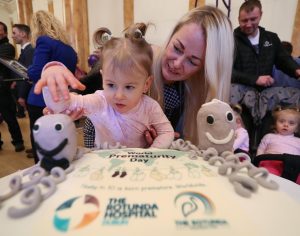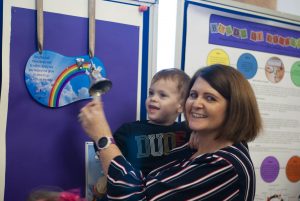–In 2018 93% of all babies born in the Rotunda Hospital at a birth weight of greater than 700 grams (1.54lbs) survived-
– The corrected perinatal mortality rate (PMR) is at an all-time low at 3 per 1,000 babies born, marking a 40% reduction from 2015, according to Rotunda Hospital figures-
– The Rotunda Hospital launches the first NICU ‘End of Treatment Bell’ in Ireland-
To celebrate premature infants born at the Rotunda Hospital, Ireland’s busiest maternity hospital, the Rotunda Foundation welcomed back about 70 families to host a party in their honour.
All babies born in 2017 who weighed less than 1500 grams along with their parents and siblings came together on the 14th of November to celebrate World Prematurity Day, and to also welcome back the first group of babies to complete the “Beads of Courage” programme.
The event also marked the launch of the new ‘End of Treatment Bell’ which acknowledges babies on completion of treatment and is rung in celebration of their departure from the hospital. The neonatal intensive care unit (NICU) at the Rotunda Hospital is the first in Ireland to receive a treatment bell. The Rotunda Hospital obtained the ‘End of Treatment Bell’ through charitable donations made through the Rotunda Foundation.
This year also marked another successful year of “Tentacles for Tinies”, a pilot project launched by the Rotunda Hospital in 2017.
The Rotunda Hospital also reported that the corrected PMR is at an all-time low at 3 per 1,000. This marks a 40% reduction from 4.8 per 1,000 babies that were born in 2015. New statistics from the report also indicate that 93% of all babies born in the Rotunda at a birth weight greater than 700 grams (1.54lbs) survived. This information is contained in the Rotund Hospital’s 2018 Annual Report, which was launched today.
Commenting on these positive results, Master of the Rotunda Hospital, Professor Fergal Malone said: “I am delighted to announce the results of our 2018 Annual Report on World Prematurity Day. A notable development for the Rotunda Hospital is the significant reduction in the corrected perinatal mortality rate, which has reduced by 40% since 2015. This is a very positive and reassuring figure. The multidisciplinary approach to antenatal care, advances in maternal-fetal medicine and neonatal pathways have contributed to this significant improvement.” World Prematurity Day is one of the most important days in the year to raise awareness of the challenges that families face as a result of preterm birth. Another significant finding in our annual report this year relates to the survival rate of premature babies born weighing more than 700 grams/ 1.54lbs, in that 93% of these babies at the Rotunda Hospital survived in 2018. While this survival is likely attributed to improvements in more than one specific area, the principle of the ‘golden hour’ post-delivery and the importance of timely interventions are recognised at the Rotunda Hospital. The quality of neonatal management in the first hour of life has important effects on not only the immediate health of the baby but also on its long term outcome.”
As the number of deliveries increases at the Rotunda Hospital, the report also showed that 99% of babies admitted to the neonatal unit survived to return home with their families. Admissions to the neonatal unit for the year were 1,116. With 8,514 overall babies delivered in 2018, the Rotunda Hospital welcomed these findings as it is now officially named the busiest maternity hospital in Ireland, for its first year.
Professor Malone concluded: “As well as marking World Prematurity Day, we are pleased to share our 2018 annual report findings today which reveals an overall stellar year for the Rotunda Hospital. In addition to positioning ourselves as the busiest maternity hospital in the country, we have also significantly improved our patient outcomes. Our financial performance was also superb effectively yielding a break-even budget, something which is highly unusual in the public health service.”











